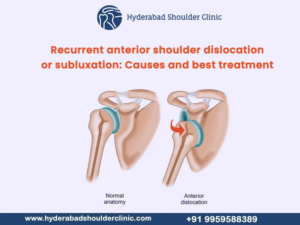What is a frozen shoulder?
A frozen shoulder is a condition causing stiffness of the shoulder joint with significant loss of range of motion in all directions. A frozen shoulder is medically termed as adhesive capsulitis. It is a common problem caused due to inflammation of the capsule portion of the joint. Mostly it affects elderly people and especially diabetics. Good physiotherapy for the frozen shoulder under the supervision of a shoulder surgeon can help to treat the condition. When the condition becomes severe, this problem can be treated with the help of advanced key-hole surgery or arthroscopic surgery.
Quick Facts About Frozen Shoulder?
- Frozen shoulder occurs due to scarring, thickening, and shrinking of the joint capsule.
- Nearly 3-5% of adults aged between 40-60 years might encounter frozen shoulder condition at some time in their lifetime, and over 20% of people with diabetes.
- About 25% of patients who have encountered a cerebrovascular disease might develop frozen shoulder within 6 months.
- Studies say that corticosteroid injections are most beneficial but only short-term. They cannot maintain pain relief after 8 weeks.
Different Stages Of Frozen Shoulder
Frozen shoulder typically progresses through three different stages: freezing, frozen, thawing.
Freezing stage:
The shoulder pain in this stage develops gradually that becomes sharp at end-range movements. Often, people will experience pain during night time while sleeping. In this stage, the range of shoulder movement is still largely preserved.
Frozen stage:
In this stage, shoulder pain begins to reduce slowly with sharp pain only felt at end-ranges of shoulder movement. Simultaneously, the shoulder becomes stiffer, and the range of shoulder movement is significantly reduced.

Thawing stage:
In the final stage, you may notice a gradual improvement in the range of motion of your shoulder with the resolution of pain.
Usually, frozen shoulder goes away on its own within 1-3 years without any treatment. If the problem persists for a long, it is better to consult a shoulder surgeon for treatment.
Causes Of Frozen Shoulder
The bones, ligaments and tendons combine to form a shoulder joint which is enclosed in a capsule of connective tissue. When this capsule around the shoulder joint thickens and tightens a frozen shoulder occurs, restricting your movement.
Doctors are not certain about the exact cause in some people. However, it’s more likely to happen in people with diabetes or immobilization of shoulder joint for a long time, such as after certain surgery where your shoulder can’t move or an arm fracture. People above 40 and older, especially women, are more prone to have frozen shoulder.
Any injury to the shoulder joint can lead to a frozen shoulder which includes tendonitis, bursitis, and rotator cuff injury or rotator cuff syndrome. Some other underlying causes like chronic inflammatory arthritis to the shoulder, after chest or breast surgery etc. can also lead to frozen shoulder.

Certain Health Factors
Reduced mobility of the shoulder joint can also develop a frozen shoulder. The immobility of the shoulder joint might be a result of many conditions, and some of them are:
- Fractures
- Rotator cuff injuries
- Broken arm
- Recovery from shoulder surgeries like mastectomy
Certain Medical Conditions
People with specific medical ailments are more prone to frozen shoulder. The conditions which increase the risk of frozen shoulder include:
- Diabetes
- Tuberculosis
- Hyperthyroidism
- Cardiovascular disease
- Parkinson’s disease
- Stroke
How does shoulder specialist diagnose a frozen shoulder?
During a physical examination, the doctor asks you to move the shoulder in different directions to evaluate the range of motion and pain. The underlying conditions involved in the frozen shoulder can be diagnosed with the history, physical examination, and X-ray of the shoulder etc.
Frozen shoulder can affect both active and passive range of motion, and in some cases, mild anaesthesia is given to diagnose the passive and dynamic range of motion.
In some cases, a contrast dye is injected into the shoulder joint while taking an X-ray to show the characteristics of a shrunken shoulder capsule of a frozen shoulder. It is called as arthrography. An MRI scan can also help to evaluate a frozen shoulder.
What conditions can mimic Frozen Shoulder?
Inflammation of the muscles around the joint, arthritis of the shoulder joint and degenerative arthritis of the joint that can mimic the limitation of range of motion.
Injury to individual tendons of the rotator cuff surrounding the shoulder can limit the range of motion of shoulder-joint but not in all directions. Often during the physical examination of the shoulder with tendinitis or tendon tear by a doctor can move the joint beyond the range of motion that the patient can focus on their own.
For more information and best treatment for frozen shoulder contact Dr Chandra Sekhar, one of the best shoulder surgeon in Hyderabad.





